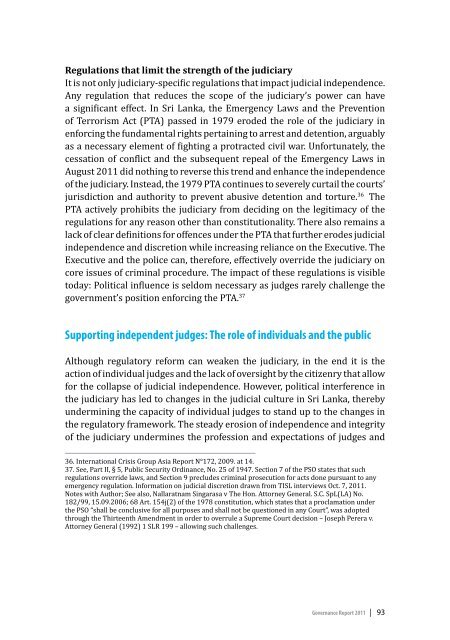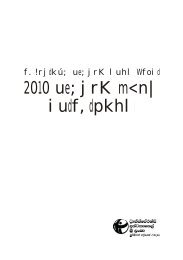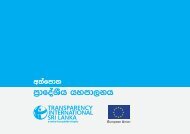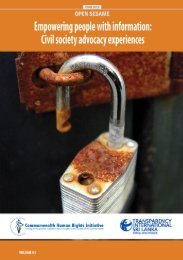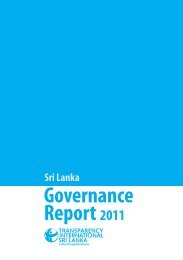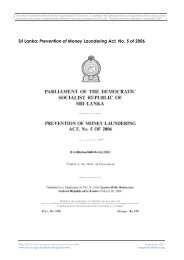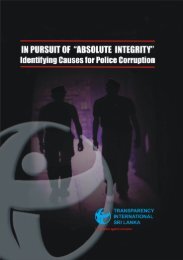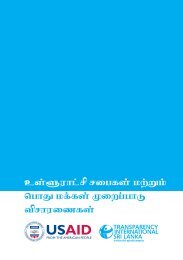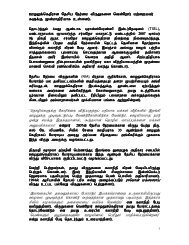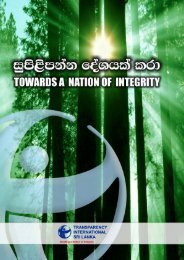Governance Report 2011 - Transparency International Sri Lanka
Governance Report 2011 - Transparency International Sri Lanka
Governance Report 2011 - Transparency International Sri Lanka
Create successful ePaper yourself
Turn your PDF publications into a flip-book with our unique Google optimized e-Paper software.
Regulations that limit the strength of the judiciary<br />
It is not only judiciary-specific regulations that impact judicial independence.<br />
Any regulation that reduces the scope of the judiciary’s power can have<br />
a significant effect. In <strong>Sri</strong> <strong>Lanka</strong>, the Emergency Laws and the Prevention<br />
of Terrorism Act (PTA) passed in 1979 eroded the role of the judiciary in<br />
enforcing the fundamental rights pertaining to arrest and detention, arguably<br />
as a necessary element of fighting a protracted civil war. Unfortunately, the<br />
cessation of conflict and the subsequent repeal of the Emergency Laws in<br />
August <strong>2011</strong> did nothing to reverse this trend and enhance the independence<br />
of the judiciary. Instead, the 1979 PTA continues to severely curtail the courts’<br />
jurisdiction and authority to prevent abusive detention and torture. 36 The<br />
PTA actively prohibits the judiciary from deciding on the legitimacy of the<br />
regulations for any reason other than constitutionality. There also remains a<br />
lack of clear definitions for offences under the PTA that further erodes judicial<br />
independence and discretion while increasing reliance on the Executive. The<br />
Executive and the police can, therefore, effectively override the judiciary on<br />
core issues of criminal procedure. The impact of these regulations is visible<br />
today: Political influence is seldom necessary as judges rarely challenge the<br />
government’s position enforcing the PTA. 37<br />
Supporting independent judges: The role of individuals and the public<br />
Although regulatory reform can weaken the judiciary, in the end it is the<br />
action of individual judges and the lack of oversight by the citizenry that allow<br />
for the collapse of judicial independence. However, political interference in<br />
the judiciary has led to changes in the judicial culture in <strong>Sri</strong> <strong>Lanka</strong>, thereby<br />
undermining the capacity of individual judges to stand up to the changes in<br />
the regulatory framework. The steady erosion of independence and integrity<br />
of the judiciary undermines the profession and expectations of judges and<br />
36. <strong>International</strong> Crisis Group Asia <strong>Report</strong> N°172, 2009. at 14.<br />
37. See, Part II, § 5, Public Security Ordinance, No. 25 of 1947. Section 7 of the PSO states that such<br />
regulations override laws, and Section 9 precludes criminal prosecution for acts done pursuant to any<br />
emergency regulation. Information on judicial discretion drawn from TISL interviews Oct. 7, <strong>2011</strong>.<br />
Notes with Author; See also, Nallaratnam Singarasa v The Hon. Attorney General. S.C. SpL(LA) No.<br />
182/99, 15.09.2006; 68 Art. 154j(2) of the 1978 constitution, which states that a proclamation under<br />
the PSO “shall be conclusive for all purposes and shall not be questioned in any Court”, was adopted<br />
through the Thirteenth Amendment in order to overrule a Supreme Court decision – Joseph Perera v.<br />
Attorney General (1992) 1 SLR 199 – allowing such challenges.<br />
<strong>Governance</strong> <strong>Report</strong> <strong>2011</strong> | 93


